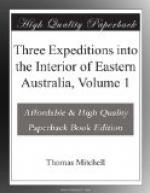No gesture of mine could convey the idea with which I wished so much to impress them, of my search for ANOTHER WHITE MAN, and after using every kind of gesture in vain, I made a bow in despair and departed. They rose at the same time, apparently glad (from fear) to see me going, and motioned as if to say you may depart now, we are friends. One of them who sat behind and who appeared to be the older of the two had a bone-handled table-knife stuck in the band over his forehead; one had also an iron tomahawk. The rest of the tribe were concealed about, as we heard their cooeys, but no others ventured to appear. I thought I could not give them further proof of no harm being intended to them than by quietly going on my way, and I hoped that this friendly demonstration might remove any apprehensions respecting Cunningham if he chanced to meet the tribe. The greatest danger to be apprehended from natives is on a stranger first approaching them when, chiefly from fear, they are apt to act on the offensive.
Continuing on the same line I crossed another small watercourse falling north-east; and beyond it were hills of mica-schist and quartz, which sloped rather boldly to the southward. We then entered one of the finest tracts of forest land I ever saw. It was there three miles in width, and bounded on the south by another low hill of quartzose gravel, the soil of which was indifferent. We at last tied up our horses on a little patch of forest land, and laid down under a few boughs, as it was quite dark and began to rain.
RANGE OF PORPHYRY.
April 22.
After a fruitless ride of twelve more miles still further southward in pursuit of distant columns of smoke, we turned our horses’ heads towards the camp on a bearing of North 56 degrees East, in which direction some summits appeared. We crossed much good whinstone land, and arrived at a small ridge where I ascended a hill consisting of a reddish granite or porphyry. From this height I again saw Harvey’s and Croker’s ranges and various hills to the southward, but I was disappointed in the view of the western horizon, which was confined to a very flat-topped woody range. I took as many angles as I could from a round pinnacle of porphyry which barely afforded standing room.
From this hill we saw smoke near another eminence which bore North 36 degrees East, distant about seven miles; and in that direction we proceeded (as it led homewards) but twilight overtook us as we crossed its side, on which the bushes appeared to have been recently burnt.
This hill consisted of a rock resembling felspar, and was connected with the former, which was of granite, by low hills consisting of schistus and trap. The former had good grass about it, and produced a chain of well-filled ponds, but here we found no water, having arrived so late. The country in general was (in point of grass at least) much better than the rotten ground on the banks of the Bogan. The water also, although scarce, was much better, and I heartily regretted that it was not in my power to proceed, according to my original plan, along this higher ground, in my progress towards the Darling.




